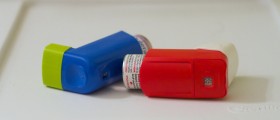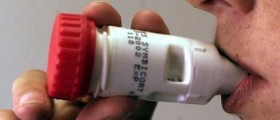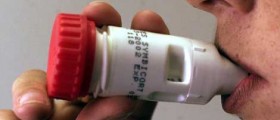
General Information about Albuterol
Albuterol is a medication prescribed to people suffering from asthma. The drug is usually in a form of inhaler which makes application rather easy. Albuterol is highly effective against many symptoms of asthma including chest tightness, chronic cough, shortness of breath and wheezing. Apart from being prescribed for asthma Albuterol can be also administered to people suffering from breathing difficulties associated with several other chronic obstructive airway diseases.
The drug acts as a powerful short-acting β2 agonist. Once β2 receptors in the lungs are activated bronchodilatation occurs and symptoms of asthma reduce. Albuterol is also responsible for relaxation of the muscles in the airways.
What Are the Forms of Albuterol?
Albuterol (as well as other β2 agonists) is either prescribed in an oral form or in an inhaled form. Still, inhaled forms of the drug are much better for application and the results occur faster. The inhaled form of the drug may be dispensed as a metered dose inhaler, solution for nebulization and a powder-filled capsule (administered by a powder inhaler).
What Are the Side Effects of Albuterol?
There are various side effects of Albuterol and each negative effect must be reported to the doctor.
The most common side effects of Albuterol include allergic reactions (usually in a form of skin rashes or hives), chest pain or chest tightness, fast or irregular heart rate, elevated blood pressure and worsening of breathing. Furthermore, the drug may be responsible for dizziness, fever and chills and visual changes (blurred vision etc.). Such side effects must be reported at once and the drug should be discontinued and replaced with a suitable substitute.
Apart from the previously mentioned, there are several other potential side effects of Albuterol that are not considered so severe but still must be reported. They include anxiousness, cough, fatigue, headache, hoarseness, itching, tremor and nausea or vomiting. Some patients complain about stomach ache, indigestion, constipation, diarrhea etc. Numbness and tingling of the face have also been reported. Several more potential side effects of Albuterol are ear pain, dry throat, pain in muscles or bones and a few psychological changes such as restlessness, nervousness and irritation.
Prior to prescribing Albuterol the doctor must be familiar with all the medications the patient is currently taking. This is vital information because Albuterol may interact with certain drugs and cause serious problems. The drug is not supposed to be prescribed if the patient is taking beta blockers like atenolol or toprol, digoxin, diuretics like Lasix and MAO inhibitor antidepressants.

















Your thoughts on this
Loading...